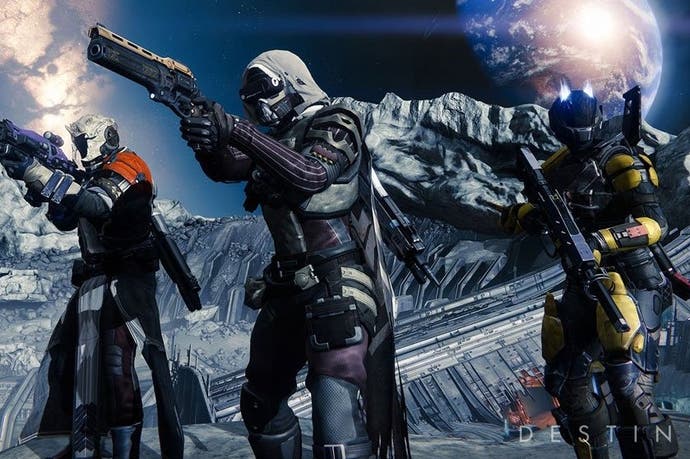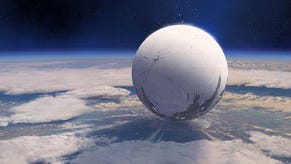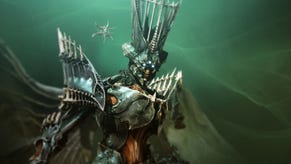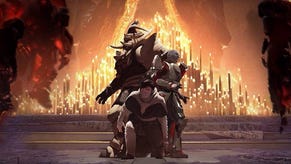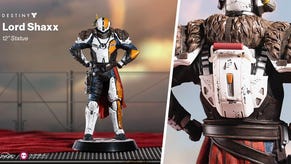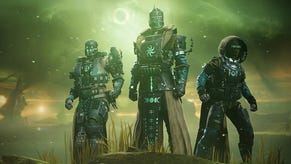How Destiny turns into Diablo when you hit the level cap
And why you need to play "a couple of hours, tops" to unlock competitive multiplayer.
In Bungie's new online first-person shooter Destiny, everything levels up. But what happens when you hit the level cap?
During the journey to get there your character, called a Guardian, gains new abilities, and the way these are given to you as you play the game is called "investment". There's even someone in charge of investment at Bungie, and his name is Tyson Green.
Tried and tested role-playing game mechanics are at play here, layered on top of the 30 seconds of fun first-person shooting gameplay loop Bungie is known for. Bungie's Halo games steered clear of a progression system for the most part. All players in Halo's much-loved competitive multiplayer, for example, began each match on a level playing field. Not so in Destiny. In Destiny, improving your character with better equipment, weapons and abilities is the name of the game.
Each of the three classes has access to a focus, a sort of tech tree, which carries your abilities within it. The core ability of all focuses is the super ability. But not all focuses, or super abilites, are available at the start of the game. You must level up to unlock them. The Titan, for example, begins the game with the Striker focus. Its super is called Fist of Havoc, which is a high damage melee AOE attack. But you can also unlock the tanky Defender focus, which is based around the Void Barrier super (like the Bubble Shield from Halo). Destiny will launch with two focuses per class for a total of six, but you'll have to play through your Guardian's progression to unlock them all.
Bungie has carefully planned out how progression should feel in Destiny. Even competitive multiplayer, aka PvP, is tied to it. In Destiny you can't jump into competitive multiplayer as soon as you pop the disc in the drive - a key point of difference with Bungie's Halo. You have to unlock PvP, but once you've done so with one character, all characters tied to your account can play PvP without restriction.
According to Green, you need to play "a couple of hours, tops", to unlock PvP. "And that's only on your first character."
But why force players to play Destiny for a couple of hours before letting them try PvP? According to Green, it's to ensure players have good enough abilities and equipment to compete.
"We found early on that people here in the studio, when they jumped on the game - these were people who were already really familiar with the game mechanics - they would roll a new character, play through the first mission then go right into PvP, and they would just get really beaten up by the other players because they didn't have a super ability yet and they'd only got an auto rifle from the first mission," Green says during a recent visit to Bungie's office.
"And they said, 'this is really awful, this is a terrible experience!' And we said, 'you're right, we have to make sure that doesn't really happen.'
"So when your first character unlocks PvP, you're a little bit further into the game. You've probably done one or two of the campaign missions, probably unlocked a special weapon and your super ability. And then once that's happened we unlock it for all the characters on your account. Once you know how the game works, if you want to take a Hunter into PvP at level three, yeah, we're okay with that. You know what the game is at that point, so that's your decision to make."
Green said he expects most players will agree with Bungie's approach here: "II think most people are going to say, 'I want to have my super ability, I want to have my Golden Gun before I go into a PvP match against other players.'"
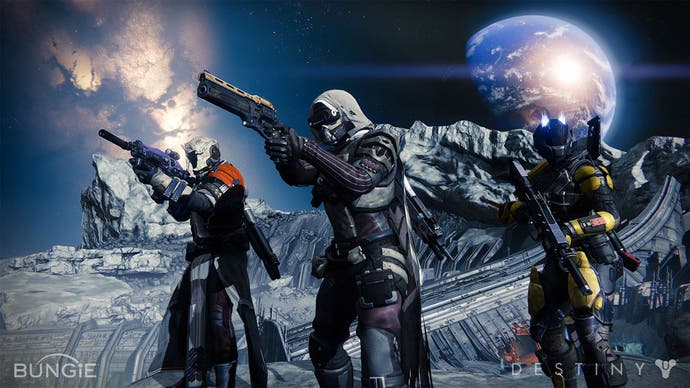
While playing Destiny you'll sometimes find gear that's beyond your character. This is where the Vault comes in. If you find a powerful weapon you want to keep for later, or even another character class, you can pop it into your Vault and trade it between your characters.
Trading is limited to characters on the same player account, however. There's no Destiny auction house, and it doesn't look like Bungie will add one to the game any time soon, but trading items between characters on different accounts is "certainly interesting and it's something we'll have to investigate", design lead Lars Bakken told Eurogamer.
Destiny aims to seamlessly integrate the Campaign with the PvP and other modes, with players using the same Guardian across all. Strikes unlock early (an example is the Cosmodrome Strike, which we played for our recent Destiny hands-on). However, there is no requirement to do these more co-op focused activities, nor is there any requirement to do a PvP activity to complete the story. "We know that's really not some people's cup of tea," Green said of the latter.
Bungie suggests players stick with the Campaign, though, because it includes some exclusive rewards and is designed to offer a smooth experience for levelling up. Conversely, to level up you don't have to do the Campaign missions at all, if you don't want to. You could work to unlock PvP and stick with that. "And we're okay with that," Green added.
"We want this to be about what you want to do and your character's story as you journey through the different activities in the game. If you were playing a game like WOW you could say, 'I could just level up in Battlegrounds,' or, 'I could do quests,' or, 'I could do dungeons.' You've got a lot of options there. If you are the kind of person who just likes Campaign, there's a pretty deep Campaign we have built, and there are reasons to go back into the Campaign and get more out of it."
Destiny uses an in-game currency called Glimmer, which you can loot from chests and enemies in the game world. It's used to buy upgrades on weapons and gear once they're unlocked, among other things. Of course, whenever a game has an in-game currency, there is the potential for micro-transactions. "We don't have anything to announce with micro-transactions at this point," was Green's careful response when quizzed on the issue. "We're concentrating on the core $60 experience and keeping the game away from needing a subscription. It's not something we're focusing on at all."
All weapons have attributes, which affect your character's stats in some way, but the way these work is a little unclear right now. Items are colour graded, like they are in World of Warcraft or Diablo. Green items are common early on, but later in the progression you'll find blues. Exotic items are gold. Items boost things like "force", which makes your abilities better. One example may be that the force stat on your weapon reduces the cooldown time on your grenade ability, but Bungie hasn't worked out the finer detail, so a lot of this is still up in the air. We do know, however, that higher level items include more stat boosts.
So, how do you gain experience? By killing things, as you'd expect, and completing missions and finishing activities. In traditional role-playing fashion, as you earn experience your character level increases (Bungie won't say what the level cap is yet, but we haven't seen anything higher than level 20). As you level up you will find and equip better gear, and vendors in the Tower, Destiny's social hub, will sell different items to you.
The idea is that in Destiny everything levels up, and that includes your focus. In the early game Destiny will tell you when an ability in your focus has unlocked, and that you should go ahead and take it, so that later, when there are more important decisions to be made, you'll know where in the menu to go to make them. You need to spend Glimmer to buy the abilities and upgrades, but it's a nominal fee. It can take longer to upgrade the better weapons you'll get later in the game, though. These upgrades often require Glimmer and materials you find in the world, perhaps while out doing Patrols.
Destiny allows you to freely swap your ability choices, but according to Green there comes a point when you can lock them in. This gives your Guardian benefits, such as a stat boost. At this point you get a copy of the same focus, but that copy levels up much faster, thus allowing experimentation.
"It's about moving onto the more horizontal growth - trying new abilities and builds and weapons, with the same element of growing more powerful as a character so I can do the harder activities that exist in the world."
Bungie investment lead Tyson Green on the Destiny endgame
What happens when you hit the level cap in Destiny? Green says getting there is "actually a pretty quick process". "We wanted levelling up and reaching a cap something you don't look at and say, 'well, that will take me weeks so therefore I can't play with my friends who are already at the level cap.'
Once you do hit the cap, Destiny is more about gaining and equipping the gear that will let you go deeper into the game, Green explained, calling it the "gear collection game". This is where the comparison with Blizzard's action role-playing game Diablo comes in.
At the cap more Strikes present themselves, six-player Raids become available and there are higher levels of PvP you can engage in with better weapons and armour. You can also unlock more abilities on your focus, which is a "longer tail process", Green says. Expect to work long and hard to unlock all the third tier options within your focus.
Essentially, the Destiny endgame is about doing activities to get the drops you want. Green compares the experience to Diablo, "in the sense that it's about moving onto the more horizontal growth - trying new abilities and builds and weapons, with the same element of growing more powerful as a character so I can do the harder activities that exist in the world."
But Bungie will also work to ensure there is something new to do in the world every day of the year.
"When Halo 2 came out on Xbox, a lot of the backbone rested either on Bungie.net or on Xbox Live," Bungie COO Pete Parsons says. "This is a real operation. We've got shifts that are working 12 hours a day, seven days a week, and within a couple of weeks, there will be people operating our data operations centre 24 hours a day, seven days a week - they'll never leave - for the next 10 years. We'll let them get lunch every now and then! There are a whole team of people who work shifts no matter what, because that's the kind of world we're building."
When Bungie talks about adding something new to the Destiny world every day, it's referring to a raft of content. New activities will be on the high end of the new daily content, but realistically what we're looking at here for the most part are new challenges, achievements and gear to obtain. "But there will be something new to do every single day," Parsons insists. "And that's cool to think about from a planning perspective. We have the time to do it right."
It's an enormous endeavour, and one that goes some way to explaining why a whopping 500 people are working on the game at Bungie's Bellevue studio as we speak.
And, according to Parsons, committing to creating new content for Destiny post-launch has its advantages.
"In many ways it's hard, but there's this thing that happens in games where you're like, well, we wanted to get all these features in but we're not going to be able to get them in, so I guess it's going to have to wait for three years until we get to the next game, and maybe there's going to be something new and even shinier and cooler that we want to do.
"With this one you have that hope. You start thinking, 'what were the things we wanted to do but couldn't get to?' Or, 'what do we think are the things the players aren't going to be ready for a while?' Then you can start slotting them in to the programming.
"We have a programming chart, which essentially says one thing: there's going to be something new to do every single day inside of Destiny from the moment players light it up for the first time."
This article was based on a press trip to Bungie's offices in Bellevue, Washington. Activision paid for travel and accommodation.
